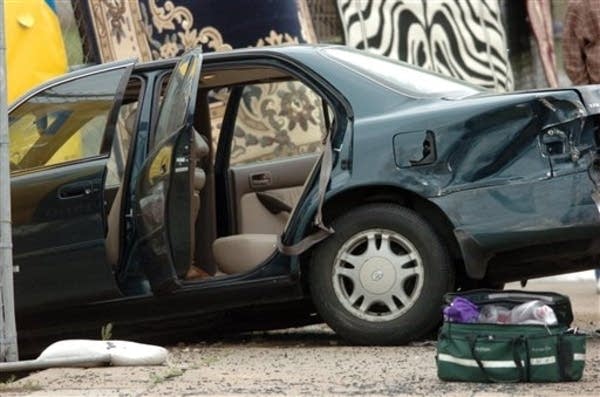Jury: Toyota must pay $11M to victims of fatal crash

Go Deeper.
Create an account or log in to save stories.
Like this?
Thanks for liking this story! We have added it to a list of your favorite stories.
A federal jury ordered Toyota Motor Corp. to pay nearly $11 million to victims of a fatal Minnesota crash on Tuesday after ruling that a design flaw in the 1996 Camry was partially to blame for the 2006 wreck.
The jury said the company was 60 percent to blame for the accident, which left three people dead and two seriously injured. But jurors also decided that Koua Fong Lee, who has long insisted he tried to slow his car before it slammed into another vehicle after he exited Interstate 94 in St. Paul, was 40 percent to blame.

Lee's attorneys insisted the crash was caused by an acceleration defect in his vehicle, but Toyota argued there was no design defect and that Lee was negligent.
"No amount of money will bring my life back, my life is not the same anymore," Lee said outside the courthouse. When asked what he would say to the family of the people killed in the crash, he said: "I want them to know that I tried everything I could to stop my car... I want them to know."
Turn Up Your Support
MPR News helps you turn down the noise and build shared understanding. Turn up your support for this public resource and keep trusted journalism accessible to all.
After the 2006 wreck, Lee was charged and convicted of vehicular homicide, and sentenced to prison. But he won a new trial after reports surfaced about sudden acceleration in some Toyotas, and questions were raised about the adequacy of his defense. Prosecutors opted against a retrial and he went free after spending 2 ½ years behind bars.
Lee and his relatives, along with other people who were injured or lost loved ones in the crash, later sued Toyota in U.S. District Court in Minneapolis. Jurors started deliberating the afternoon of Jan. 28, and the verdict was announced late Tuesday afternoon.
During the trial, Lee's attorney, Robert Hilliard, told jurors that there was a defect in the car's design. He said the Camry's auto-drive assembly could stick, and when tapped or pushed while stuck, it could stick again at a higher speed.
Hilliard also accused Toyota of never conducting reliability tests on nylon resin pulleys that could be damaged under heat and cause the throttle to stick.
"This is what makes the car go. This is what turns it into a torpedo, a missile, a deadly weapon," Hilliard said during his closing argument.
Toyota said there was no defect in the design of the 1996 Camry, and that Lee was negligent. The company's attorney, David Graves, suggested that Lee was an inexperienced driver and mistook the gas pedal for the brake, and that's why the car accelerated.
Toyota also noted that Lee's car was never subject to the recalls of later-model Toyotas.
Jurors were asked to decide whether there was a defect in the design of the 1996 Camry that was unreasonably dangerous, and if so, whether that defect caused the plaintiffs' injuries.
The crash killed the driver of the other vehicle, Javis Trice-Adams Sr., and his 9-year-old son, Javis Adams Jr. His 6-year-old niece, Devyn Bolton, was paralyzed and died in October 2007.
Trice-Adams' daughter, Jassmine Adams, who was 12 at the time, was seriously injured, as was Trice-Adams' father, Quincy Ray Adams. Those two and Devyn Bolton's mother, Bridgette Trice, were the other plaintiffs in the case.




